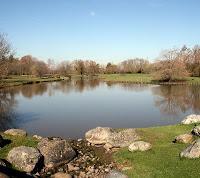 Question: Where in Bordeaux can you view cows, roses and vines, stroll alongside a mock Pyrenean mountain stream, sit on a bench from Munich, dispose of litter in a dustbin from Madrid and unwind in a Japanese garden? Answer: the Parc Floral in the Bordeaux-Lac quarter to the north of the city.
Question: Where in Bordeaux can you view cows, roses and vines, stroll alongside a mock Pyrenean mountain stream, sit on a bench from Munich, dispose of litter in a dustbin from Madrid and unwind in a Japanese garden? Answer: the Parc Floral in the Bordeaux-Lac quarter to the north of the city. The 1992 opening of the Parc Floral tied in with an international flower festival, Les Floralies Internationales de Bordeaux. Over the 20-or-so ensuing years, the 50-acre landscaped park and its neighbouring 320-acre wood, le Bois de Bordeaux, have become the territory of joggers, ramblers and cyclists, and cultural events are also occasionally held there.
Despite having long been aware of the place, it wasn’t until researching this item that I took the time out to visit the Parc, and was pleased to be greeted by information panels providing lots of detailed information about flora, fauna, the number of gardeners (14), the low ambient noise levels (45 decibels), the electric vehicles used by maintenance staff, biodiversity, biotopes and lots of other words I had to google. What I wasn’t expecting though was to also be greeted by a (small) herd of cows.
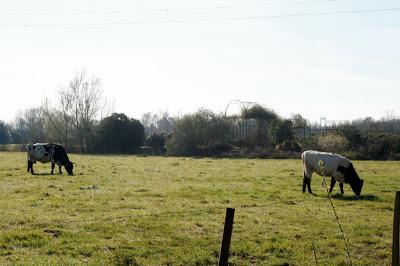
Eagle-eyed readers may spot the Pont d'Aquitaine in the distance.
The cows are a local breed of dairy cattle, la “vache bordelaise”, which were commonplace in the 19th century in Aquitaine and beyond. By the 1960s it was thought that the breed had died out until a strand was somehow re-discovered in 1990. An animal preservation society, Conservatoire des Races d’Aquitaine, has set about re-developing the breed – the cows at the Parc Floral belong to them and they are regularly on hand to observe and monitor them.
From then on the sights are perhaps more typical of a “floral park”. A 5,000-square-metre rose garden features no less than 479 different types of roses and, according to the official literature, “retraces the history of the rose from ancient times to the present day”. The roses weren’t yet in bloom when I was there but I can imagine the full-colour version of the rose garden must be impressive to behold.
Nearby is a section known as the "vine collection" comprising a wide range of cépages (or types of grape: Cabernet, Cabernet franc, Cabernet sauvignon, Merlot, Pinot gris, Pinot noir and many others from Eastern Europe, Israel and North America), some of which are either very rare or very old. The grapes are not picked or transformed into wine though - most are consumed by the birds! The Parc is also home to 65 types of peonies (pivoines in French), a fine collection of magnolia trees, irises (180 varieties) and rhododendrons (150 different types).
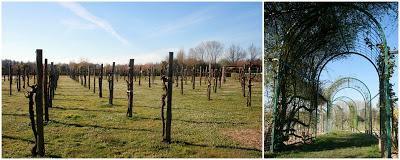
The vine collection and rose garden.
Moving further on into the Parc and an artificial lake provides a natural focal point for the visit. Feeding the lake is a 250-metre-long feature that has been constructed to resemble a mountain stream (referred to as a “le Torrent” in the official blurb, but it was more of a trickle when I was there, and certainly not especially torrential). To get the mountainous feel just right, 300 tons of rocks and pebbles were transported up from banks of the Gave de Pau river in Argelès-Gazost down in the Pyrenees. Before being channelled up to the artificial source at the top of the mound, the water is collected from different “jalles” (streams which flow eastwards into the Garonne river) in the vicinity.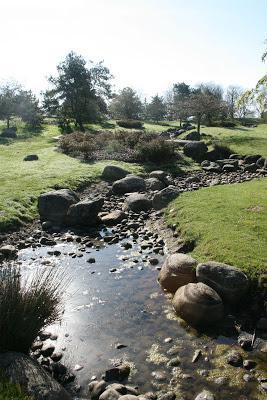
However, my trek through the Parc Floral was saving the best until last. In a section known as “jardins des villes jumelles” (the twin city gardens), eleven different areas have been designed to make visitors feel as if they have been magically transported to other parts of the world. Built around items which have been donated by the twin cities of Bordeaux, the gardens manage to recreate a little bit of Germany, Spain, Japan, Morocco and a whole host of other exotic destinations!
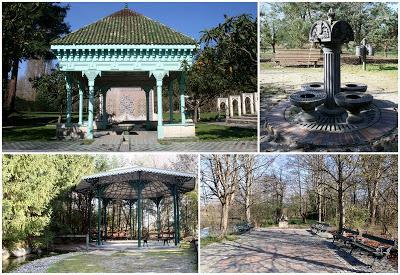
Clockwise from top left: the Casablanca (Morocco), Madrid (Spain), Munich (Germany) and Montreal (Canada) gardens.
My personal favourites were the gardens representing Munich, complete with benches and statues; Madrid, with lamppost, drinking fountain and dustbins; the Moorish mosaics in the Casablanca display; and the peaceful Japanese garden that represents Fukuoka. The only disappointment was to see the garden which should have transported me back to my hometown Bristol, which is currently just a bit of greenery and some tall trees (admittedly not unlike most parks in Bristol)… although part of it was cordoned off suggesting enhancements may be on the cards.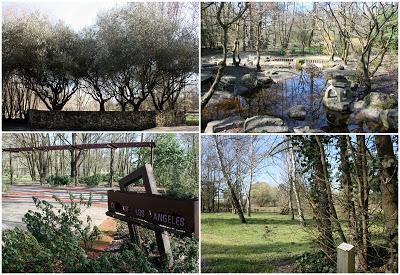
Clockwise from top left: Ashdod (Israel), Fukuoka (Japan), Bristol (UK) and Los Angeles (US).
Meanwhile, work is also in progress just next to the Parc Floral, where the future Stade Bordeaux-Atlantique sports arena is slowly taking shape. This means that one of the entrances to the Parc is currently closed, but as the area becomes increasingly developed in the coming years (tram line C will stop just metres away) it strikes me that, for better or for worse, the Parc Floral may just lose its status as one of the city’s best-kept secrets...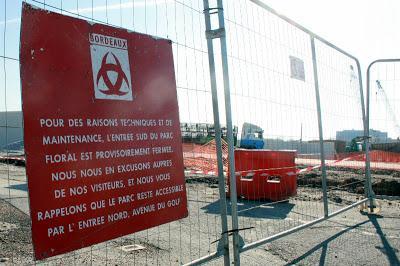
- Find it: Parc Floral, Avenue du Golf, Bordeaux.
